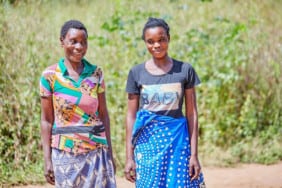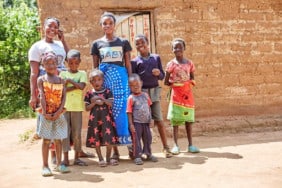Keeping Girls in School: Abigail’s Story
July 27th, 2022 | Stories
Abigail was born and raised in a small town in the mineral-rich Copperbelt province in Zambia. She loved going to school and pursued her primary and part of her secondary education with passion. But when she reached 11th grade, her family struggled to pay her tuition fees. She fought hard to stay in school. She remembers going to school, aware that she was behind in tuition payment, only to be sent back home without attending classes.
She even tried to sneak back into class after the accountant left, only to be turned back later. After dropping out of school, Abigail felt so deeply hurt she would cry when she saw her friends go to school. Her mother, too, says she felt so bad for her daughter that she remembers “questioning God” while she cried.
 Abigail and her mother. Photo: Kafwa Sichilima
Abigail and her mother. Photo: Kafwa Sichilima
Girls in Zambia like Abigail face daunting challenges to graduating from secondary school. Many drop out before completing their education due to financial constraints, early pregnancy or marriage, long distances to school and gender-based violence, among other factors.
Despite these challenges, when given the right support, these girls can be brought back into the education system even after years out of school. Thanks to the support from the Government of Zambia’s Keeping Girls in School (KGS) initiative aimed at reducing secondary school drop-out rates among vulnerable adolescent girls, Abigail was able to return to school.
 Abigail and her friend have both signed up at the Katembula Youth Resource Center. Photo: Kafwa Sichilima
Abigail and her friend have both signed up at the Katembula Youth Resource Center. Photo: Kafwa Sichilima
The family was surprised when a guidance and counseling teacher visited their home to inform Abigail that she qualified for the KGS program. “I first heard about KGS through the guidance teacher at the local school. She was going around the community advising girls that had dropped out of school to re-enroll and they would get support from the KGS program,” said Abigail.
Eager to continue her education after two years and with two children to support, Abigail felt hopeful again and signed up for the program. She met with the guidance and counseling teacher who assessed additional supports needed to help Abigail stay in the program, arranged for her to receive psycho-social support services, and connected her to peer groups to build her knowledge and resilience.
Abigail joined Katembula Youth Resource Center, a vocational training center, where she is learning agriculture. She reasoned that vocational training would provide her with the skills she needs to support her family. She is now confident that she will attain her dream of becoming a farmer and/or a farming consultant advising other farmers on how to increase their productivity.
KGS is implemented by the Bantwana Initiative of World Education and Bantwana Zimbabwe in close partnership with the Ministry of Education of Zambia.
World Education fosters enduring partnerships across regions and sectors to advance education outcomes for all. We offer education systems strengthening, program design and implementation, applied research and evaluation, capacity development, and policy development services.